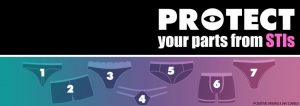
By: Jennifer McMillen Smith, LISW-S, HIV Social Worker at MetroHealth Medical Center and medically reviewed by Ann K. Avery, MD, Infectious Disease Physician at MetroHealth Medical Center
HIV affects all people, and yes, that includes teenagers. So, should teens get tested for HIV? We’re over here screaming yaaaassssssss! Teens nowadays may not have great sex ed at their schools, but that doesn’t mean they shouldn’t be educated on getting tested.
According to the Center Disease Control, U.S. teens who are 13-24 have accounted for 22% of new HIV diagnoses in 2015. Crazy, right?! You can’t treat what you aren’t aware of. So, let’s dig into why it’s important for teenagers to get tested.
Gettin’ busy
Come on, we aren’t dumb, y’all. You, adolescents, aren’t foolin’ anyone, especially us! We all know that many teenagers are gettin’ it on. No judgment here; we know how great sex can be 😉. It’s okay to do it, as long as you’re practicing safer sex, and most importantly – getting tested!
The CDC estimates as many as 60% of young people with HIV don’t even know they have been infected, and that is most likely because they haven’t been tested. The CDC recommends that everyone aged 13-64 years should get tested at least one time in their life, and if you’re sexually active, the sooner the better!
Annual HIV testing is recommended for some individuals, especially sexually active gay and bisexual men, those who have had more than one sexual partner since their last HIV test, and those who have had another sexually transmitted disease.
Come join our private, stigma-free, supportive community.
Health management tools with medication & appointment reminders.
Social networking in a community conversation & private chats.
Getting tested the sooner, the better
Did you know there are roughly 35,606 cases of HIV infection were diagnosed in the U.S. and reported to the CDC, about 7,700 were people aged 13-24 years old? Yep. You read that right. Typically, older adults in their 20s are the ones getting tested. It’s time we change this narrative, y’all! We want to stress the importance of getting tested as soon as possible so you can take care of yourself, and your future partners.
According to a recent survey done by Guttmacher Institute, all 50 states allow most minors to consent to testing and treatment for sexually transmitted infections (STIs), as well as HIV testing and treatment!. So, what are you waiting for? Get to testing!
HIV test types
There are several places, like a local clinic or your doctors office, where younger people can get an HIV test. Here are a few most common types of tests when you get tested:
- Antibody screening test is the most comment type of HIV test. It test for the antibodies that your body makes against HIV. It may be performed by a blood test or a cheek swab.
- Antigen/antibody combination test can find recent infection earlier than test that detect only antibodies. This combination test can find HIV as early as three weeks after exposure to the virus. However, this is only available as a blood test.
- Rapid test is an immunoassay used for screening and produces results within 30 minutes, which is crazy fast! Rapid tests use a finger stick or a cheek swab to look for antibodies to HIV.
- The OraQuick In-Home HIV Test will give you quick results at home. This test procedure requires you to swab your mouth for an oral fluid sample using a kit to test it. Results will appear after 20 short mintues! A positive test result will require a follow-up test.
Positive Peers is here to support you!
We get it, HIV is not something you want to shout from the rooftops. But we are here to remind you that you can still live your best life no matter your status or how old you are! If you test positive, you have the choice to decide whether to share your HIV status with others. It’s important to think about people you rely on for support and what exactly you want to disclose with those people.
Remember, you are not alone, and that’s why it’s important to get tested and take charge of your life. If you’ve tested positive for HIV, Positive Peers is a safe community that will walk by your side every step of the way.
Related Blogs:





